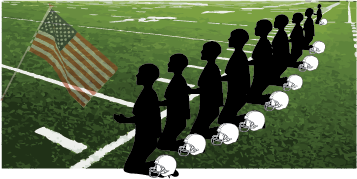You have a right to sit, stand or kneel
September 26, 2017
People are taking a stand by not standing.
When at least 200 NFL players knelt, locked arms or neglected to appear during the National Anthem at all, they were protesting President Donald Trump’s comments on being punished or fired if they choose not to stand for the National Anthem.
The Pittsburgh Steelers played the Chicago Bears at Soldier field in Chicago this past Sunday and anyone watching noticed that almost the entire Pittsburgh team stayed inside their locker room during the singing of the National Anthem. Similar to the Steelers, the Seattle Seahawks did not take field for the National Anthem.
Even the green and gold took a stand on the issue. The Green Bay Packers President Mark Murphy had stated that the players have worked hard to get where they are and they will support a player and their beliefs.
The issue of not standing for the National Anthem started with Colin Kaepernick who used to be the quarterback for the San Francisco 49ers. He was the first to kneel for the national anthem at a game in 2016 as a protest towards police brutality.
The Steelers decided not to stand for the National Anthem this past Sunday due to comments from President Trump that those players who choose not to stand are “sons of bitches.”
It’s an American’s right to chose to stand for the National Anthem or not. Having the ability to demonstrate one’s dissent and protest is fundamental to our rights as citizens, as it is guaranteed to us in the First Amendment.
One argument for standing for the flag regardless of political feelings that it is disrespectful to not stand for those who have fought for our country. At the same time, the same soldiers have fought for us to have the First Amendment.
It’s important to remember that the First Amendment is not built on a subjective idea of what is respectful, but instead limits the government in their actions in regulating what can be said, and in what demeanor.
Additionally, the Supreme Court has often ruled in favor of protecting the free speech of citizens who are making a political statement about their government. In Texas v. Johnson, the Court affirmed that burning a flag is a protected form of free speech, because the action speaks to a person’s ability to air their grievances with politics.
What is more frustrating is the diversion from larger problems in America that are taking a backburner to whether athletes should have free speech.
When the president addresses and tweets about respect for the American flag, one cannot help but feel there are more important things to think about in our nation. We have hurricanes that have hit landfall in Florida, Texas and Puerto Rico.
We should be doing all we can to help them, and not focus so much on what the NFL is doing and what avenues professional athletes have used to express political dissent.
We also respect the sole Steeler player, Alejandro Villenueva, that stood for the national anthem, because we all have the right to decide whether we stand for the anthem or not.
We have been taught to feel that it is respectful to stand, take a hat off and face a flag when the National Anthem comes on because of all of the men and women that have fought for our freedom.
There is nothing wrong with standing for your nation, but at the same time, kneeling or not standing for the nation should not be controversial. We have the choice to stand or not and as a student at University of Wisconsin- Whitewater.
Everyone has a right to their own opinion on what is acceptable in the presence of an American flag, but one cannot decide for all how a person must protest.
If we budge on the First Amendment rights of one, all of ours are at risk.













